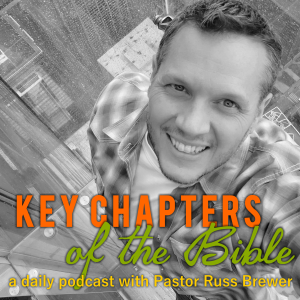
Anyone who has read much of Leviticus knows that it has a lot to say about "blood". Although it's kind of an unusual topic in our day and age, it was central to the Old Testament system of worship. Today, as we study Leviticus 17, we find out why. We also find that it's in the context of God's prohibitions about homemade, made-up worship. So join us in another study in another Key Chapter of the Bible!
DISCUSSION AND STUDY QUESTIONS:
Leviticus 17 1. What did verses 3 & 4 prohibit? In light of what we learned from Leviticus 10, what principles were driving this instruction? How might a person who did not live near to the tabernacle think they could cut corners and engage in personal, private worship?
2. Verse 5 calls the people to engage in “peace offerings” at the tabernacle under the oversight of the priest. What did we learn about peace offerings in our study of Leviticus 3, specifically in terms of communion and fellowship with one another? Why was this critical for the spiritual life of the Children of Israel?
3. The podcast also suggested that the prohibitions against private sacrifices would put an end to “religion for hire”. In what ways would this command end that practice?
4. The podcast also suggested that this command would help people break from thinking that religion was all about personal blessing. How would not engaging in private sacrifices do this?
5. Even after these commands were given, how did people violate these prohibitions of “religion for hire” or “religion for personal blessings”? How do we see people in our world still falling into these temptations today?
6. In verse 7, what does the phrase “no longer” indicate about the need for this prohibition against the worship of goat-demons?
7. In verse 11, why weren’t the people allowed to eat the blood of an animal? What did that blood represent?
8. Already, our study in Leviticus has shown us how integral blood is to the sacrificial system. In what ways have we seen its use in the sacrifices?
9. In verse 13, an animal’s blood that was spilled on the ground was to be covered in dirt. How does this help us see the sacredness of even an animal’s blood? Does the world reflect this sacred view of blood in how blood is characterized in movies and TV?
10. How does Hebrews 9:18-22 help us understand how these principles relate to the blood of Jesus?
11. The podcast makes an interesting link between the priest’s sacrifices of the Old Testament and their role in the death of Jesus. What was that link? Do you think this was deliberate or just a coincidence?
12. In light of everything we’ve said about blood in Leviticus 17, what have you learned and how has it helped you understand Christ’s shed blood for your sins?
Check out our Bible Study Guide on the Key Chapters of Genesis! Available on Amazon!
To see our dedicated podcast website with access to all our episodes and other resources, visit us at: www.keychapters.org.
Find us on all major platforms, or use these direct links:
Spotify: https://open.spotify.com/show/6OqbnDRrfuyHRmkpUSyoHv
Itunes: https://podcasts.apple.com/us/podcast/366-key-chapters-in-the-bible/id1493571819
YouTube: Key Chapters of the Bible on YouTube.
As always, we are grateful to be included in the "Top 100 Bible Podcasts to Follow" from Feedspot.com.
Also for regularly being awarded "Podcast of the Day" from PlayerFM.
Special thanks to Joseph McDade for providing our theme music.
More Episodes
 2024-10-31
2024-10-31
 2024-10-15
2024-10-15
 2024-10-14
2024-10-14
Create your
podcast in
minutes
- Full-featured podcast site
- Unlimited storage and bandwidth
- Comprehensive podcast stats
- Distribute to Apple Podcasts, Spotify, and more
- Make money with your podcast
It is Free
- Privacy Policy
- Cookie Policy
- Terms of Use
- Consent Preferences
- Copyright © 2015-2024 Podbean.com





